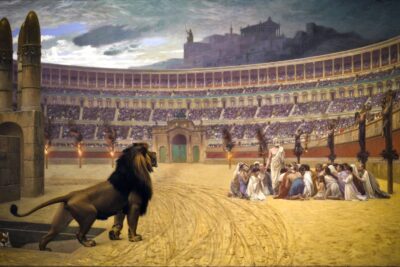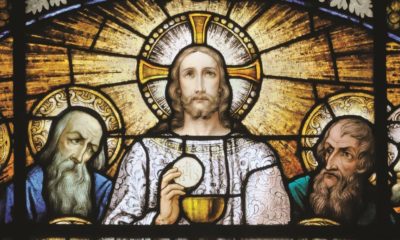July 24, 2022
|by N W
|
0 Comments
|
Deacon Mark, Discipleship, Humility, Mary, Prayer
Seventeenth Sunday in Ordinary Time
July 24, 2022 — Year C
Readings: Gn 18:20-32 / Ps 138 / Col 2:12-14 / Lk 11:1-13
by Rev. Mr. Mark De La Hunt, Permanent Deacon
In this homily we will look to Mary and Jesus to give us examples of how to pray.
In the year 1450, an Italian Dominican friar named Fra Angelico painted a fresco of Mary and the angel Gabriel at the top of a staircase in a convent in Florence. There is a nearby window that allows the sun to shine on the fresco in the early morning hours, enlivening its colors. Interestingly, the effect is most pronounced around March 25, the Feast of the Annunciation. Well done, Fra Angelico. What does Fra Angelico’s fresco of the Annunciation have to do with prayer?
While reflecting on this fresco in a papal audience, St. Pope John Paul II said that Mary represents the model of the Church in prayer. He said she was probably praying when Gabriel came to her home in Nazareth. Being immersed in prayer enabled her to receive Gabriel’s message and to say yes to God’s plan. John Paul II went on to say that “Mary represents the model of every expression of our prayer life. In particular, she teaches Christians how to turn to God to ask for his help and support in the various circumstances of life” (General Audience, Sept. 10, 1977). How so?
In the Annunciation, Mary models for us the form of prayer known as Lectio Divina, which means divine reading. If you only hear silence when you pray and just feel like you are talking to yourself, Lectio Divina would be a great way to turn that prayer monologue into a dialogue with our Heavenly Father.
There are five steps to Lectio Divina prayer: 1) Read a passage from scripture; 2) Reflect or meditate on it; 3) Pray; ask God what that passage means for you; 4) Rest and be quiet, listening for His response; 5) Act on what God placed on your heart. Let’s look at how Mary models Lectio Divina during the Annunciation event.
In the Annunciation, step one of Lectio Divina occurs when Gabriel, God’s messenger, speaks to Mary. This is like our hearing God speak to us while we read scripture. Mary then “ponders what sort of greeting this might be.” That is step 2, reflecting on God’s word. In step 3, Pray, she speaks to Gabriel, asking “How can this be, since I have no husband?” After speaking, she listens to Gabriel, which is step 4, being quiet and contemplating. It is only while listening that Mary hears Gabriel tell her God’s plan for her life. Finally, in step 5, she acts on what God placed on her heart, going in “haste” to help her cousin Elizabeth, who was pregnant with John the Baptist.
Mary is a model of prayer and indeed the last time we see her in scripture, she is at prayer with the newly formed Church (Acts). She and Joseph taught Jesus how to pray, and we best learn from His example (CCC 2598-2622). It starts with His frequenting the synagogue, where He focused on the word of God, and in the temple, where He focused on the Holy Sacrifice (CCC 2599). In both cases He did so in community with other believers. What He did in the synagogue and the temple is perfected and fully experienced by us at every Mass. To pray like Jesus then, we should go to Mass frequently.
In today’s gospel, notice that, after seeing Jesus pray, His disciples ask Him to teach them how to do so (Luke 11:1). Regarding this passage, the Catechism says, “By contemplating and hearing the Son, the master of prayer, the children learn to pray to the Father” (CCC 2601). How did Jesus pray?
The Catechism tells us that Jesus prayed before decisive moments in His life, including before His baptism, before His passion and death, and before choosing the Twelve apostles (CCC 2600). To pray, He sought solitude, often at night, and often after caring for many people, such as feeding the 5,000 and healing “many who were sick” (CCC 2602 Lk 5:16, Mk 1:35; 6:46).
Wouldn’t you have loved to be able to listen in while Jesus was praying? Fortunately, He let us do so on a few occasions. In two of them, He began by thanking God, acknowledging Him as Father and Lord (CCC 2603; Mt 11:25; Lk 10: 21-23).
I’ll share one of those. Before raising Lazarus from the dead, Jesus says, “Father, I thank you for having heard me” (Lk11:41). This teaches us that God hears our prayers, and we can and should thank Him in faith before we receive what we asked for (CCC 2604). King David expresses this truth well in today’s psalm, “On the day I cried out, you answered” (Ps 138:3). In that same prayer before raising Lazarus, Jesus added, “I know that you always hear me,” which implies that Jesus prayed often (Lk 11:41).
To help us remember what Jesus taught us to pray and in what order, there is an acronym, ACTS. The “A” stands for Acclamation or Adoration. The “C” stands for Confession of your sins. The “T” stands for Thanksgiving, and the “S” stands for Supplication, which is asking for what you and others need.
Like the Lord’s Prayer in the gospel, ACTS starts with Acclaiming or Adoring God, “Hallowed be thy name.” This is important for two reasons. One, we were created for praising God and are most at peace when we are doing so. And two, it grows our humility to acknowledge God is almighty, and we are not. Confessing our sins also grows our humility and opens us up for Him to heal us. Thanksgiving helps us remember the grace and gifts we have received. This in turn strengthens our faith that God has heard and answered our prayers before and will do so again. With our faith strengthened, we can confidently enter into Supplication.
Here is an example of prayer from my life. This was fifteen or so years ago. My lung disease was flaring up, it was around midnight, and I was coughing, trying to clear my airways. Suddenly, the stuff in my airways lodged, and I could only take very short breaths. I was scared and called the emergency line for the pulmonology clinic, which I had never done before and have not done since. The doctor told me to go to the ER. I fell on my knees in the dark and started to cry in my tiredness and fear and prayed to Jesus to help me. I then got up and started to dress to go to the ER when the blockage unexpectedly broke free.
The blockage turned out to be what is called an airway cast. It was a perfect mold of the inside of my airway, about an inch long and solid. It’s a miracle that it broke loose. Coincidence? There is more. The next day I was symptom free, no fever and no congestion. Normally I need an antibiotic to recover after an infection like that. Jesus didn’t just clear my airway as I asked, He healed the infection too.
What was notable about that prayer? I completely surrendered to Christ. There was not a shred of pride between me and Him; I was helpless. I prayed with all my heart, fully aware of how dependent upon Him I was. 1 Cor 12 comes to mind, “for when I am weak, then I am strong.” Psalm 116 also comes to mind, “I was helpless, but He saved me.” Jesus heard me, and He cared, and He healed me. He is that way with everyone who asks, seeks, and knocks.
We can’t have an intimate and fulfilling relationship with our spouse without regular, undivided attention and conversation, so too with God. And just as regular and meaningful conversation with our spouse is an act of love and brings happiness and joy and gives us strength to meet the challenges of life, so too conversation with God in prayer builds our relationship with Him. You may think you are too busy for conversations with God like that between Mary and Gabriel, but when you make time for prayer you will start noticing that everything else works out just fine.
I’m going to let the member of the Holy Family who never spoke have the last word. The scripture says Joseph was righteous, meaning he was aligned with God’s will. And not once, and once would have been impressive, but twice, God speaks to Joseph in his dreams. Surely these things are the result of Joseph having a rich prayer life. He didn’t just pray, though. After God spoke to him in his dreams, immediately after waking up, Joseph did what God asked of him. In doing so, he saved those he loved.
Mary and Joseph, pray for us. Jesus, thank you for hearing us and perfecting our prayer before your Father. Heavenly Father, thank you for caring. Amen.
KEEP READING
 540-586-8988
540-586-8988 










